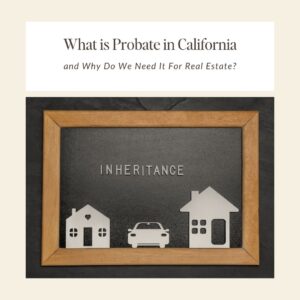What is Probate in California and Why Do We Need It For Real Estate?

I’m often asked what Probate is when a loved one passes away and how it effects real estate (usually a family home). It’s understandable to be unsure about the purpose Probate serves. Let me walk you through it in a general way so that you understand the basics.
Although I have helped many people with the sale of an inherited home as part of a Trust or Probate, I’m not an attorney or a tax specialist, so for your more specific questions you should reach out to those professionals. Now, let’s get the big picture view of Probate and how it relates to real estate…
In simple terms, Probate is a court-supervised process to transfer the deceased person’s assets and property to the rightful beneficiaries or heirs. There is both personal property, such as furniture and cars, and “real” property, which is real estate of any kind, from raw land, to apartment buildings, to single-family homes. Probate involves gathering the assets, paying any debts or taxes owed, and distributing what’s left to the heirs by order of the court.
So, Probate is a court-sanctioned process that allows the transfer of the decedent’s property to the living heirs. Let’s put it in real estate terms we can relate to…think about when you sell a home. As the owner, you sign the deed to transfer ownership to the buyer, right? Well, when someone passes, they obviously can’t sign the deed anymore. So the Probate court needs to appoint a “Personal Representative” who will act on behalf of the deceased person. This person will be an Executor if the deceased specifically named them in the will, or an Administrator if there is no will. The Personal Representative has the legal authority to sign a deed for the deceased, and the court oversees the activities of the Personal Representative to make sure everything is done correctly according to California law.
A key purpose of Probate is to provide “title clearance” for any property or assets still in the name of the deceased. As I mentioned above, the court appointed Personal Representative is there to act on behalf of the decedent, under the supervision and guidance of the Probate court. This gives the Personal Representative the ability to sell assets (if needed), including real estate, so that the beneficiaries can then receive the gift intended for them. Once any property (both real and personal) is sold, the proceeds are used to pay any creditors, any court fees, any attorney and realtor fees, any compensation to the Personal Representative for their time and effort, and any taxes due. After all payments are made, the remaining amount is then distributed to the rightful heirs.
As of the date of this writing, the dollar amounts that determine whether you need a full probate administration recently increased in California. Let me explain what this means.
For someone who passed away on or after April 1, 2022, the estate value threshold for requiring probate went up from $166,250 to $184,500. That’s a pretty big jump!
What does this look like in a real life scenario? I’ll give you an example that will help with understanding the change. Let’s say someone died on March 30, 2022 and left a house worth $170,000. Their estate would need to go through probate since that house value exceeds the old $166,250 threshold.
But if another person passed on April 2, 2022 with the same $170,000 house, probate would NOT be required for their estate. That’s because the house value falls under the new higher $184,500 threshold that started on April 1st.
So, in this example, the date of when someone passed and the new threshold makes the difference on whether probate is necessary or not.
Now, even if an estate is valued under $184,500, it doesn’t mean you’re completely off the hook. There would still be some special court involvement required to transfer assets. You’ll want to consult with an attorney who specializes in Estate Planning & Probate. Let me know if you need a referral to one.
To sum it all up, Probate facilitates asset transfer when someone passes by appointing a Personal Representative. The Probate court supervises the activities of the Personal Representative (the Executor or Administrator) to make sure it’s all done correctly.
If you’re wondering “Do we have to go through Probate?” then check out my article “9 Times When Full Probate is Not Required to Transfer Real Estate in California” to find out if your situation is one of the exemptions to the Probate process.
I hope this helped give you an overview of how the Probate process impacts real estate. Let me know if you have any other probate real estate questions. I’m here to discuss this difficult subject and if necessary, assist you with selling an inherited property or home.
Hello!
I'm Rachel & I help people at all levels, from First Time Buyers, to those Buying & Selling Luxury Estates.
For those who have a Home to Sell, including Inherited homes, I have extensive experience to make the process fast and easy. Let me know how I can help you with your unique situation.
Inherited Home
Sell With Ease
Client Success Stories
All Articles
SCHEDULE YOUR FREE CONSULTATION